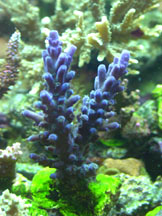|
Michael Paletta - Guest Author |
 |
|
The use of Calcium chloride (for example,
Kent Turbo Calcium or Warner Marine Calcium) was probably the first method of maintaining proper calcium levels employed by most seasoned reef hobbyists. Calcium chloride is widely available, inexpensive and it dissolves rapidly into solution. But when it was understood that calcium chloride could deplete the buffering capacity of an aquarium, (if added too quickly), its use was paired with buffering compounds, such as
Seachem Reef Builder or Marine KH Buffer w/ Magnesium, to maintain proper alkalinity.
Advantages
- Inexpensive and readily available.
- Dissolves rapidly into solution.
- Easy to use, precise dosage can be added since it is possible to mathematically determine how much is needed.
|
Caveat
- Affects Alkalinity - When used alone, supplementation with Calcium chloride can deplete the buffering capacity of an aquarium. This can be corrected by adding buffers.
- Improper use may result in "See-Saw" effect where calcium chloride and buffer need to be added regularly to counteract the effects of the other.
- Certain elements may begin to accumulate to unnatural levels over time. In particular, sodium and bromide levels may build up since most buffers contain high concentrations of these elements. Remedied by performing more and larger water changes.
|
 |
Ideal Application - The use of Calcium chloride is a simple and easy way to maintain calcium levels for small aquarium systems or ones that do not have high calcium demands. Aquariums with small amounts of coralline algae or small population of soft corals are examples of such aquariums. If you are maintaining this type of reef aquarium with relatively low calcium demand, this method should work without producing the problems described.
Regardless of the method, maintaining proper calcium levels go hand in hand with maintaining proper alkalinity levels as well as
testing and monitoring these levels. When employing any calcium supplementation method, it is crucial to test for both calcium, alkalinity and pH levels in your reef system.
Part 4 of 6. Continue reading:
Biography
Michael Paletta is the author of two books, "The New Marine Aquarium" and "Ultimate Marine Aquariums," and has acted as a consultant with the National Aquarium in Baltimore and the Pittsburgh Zoo Aquarium.
|
|
|
|

|
|